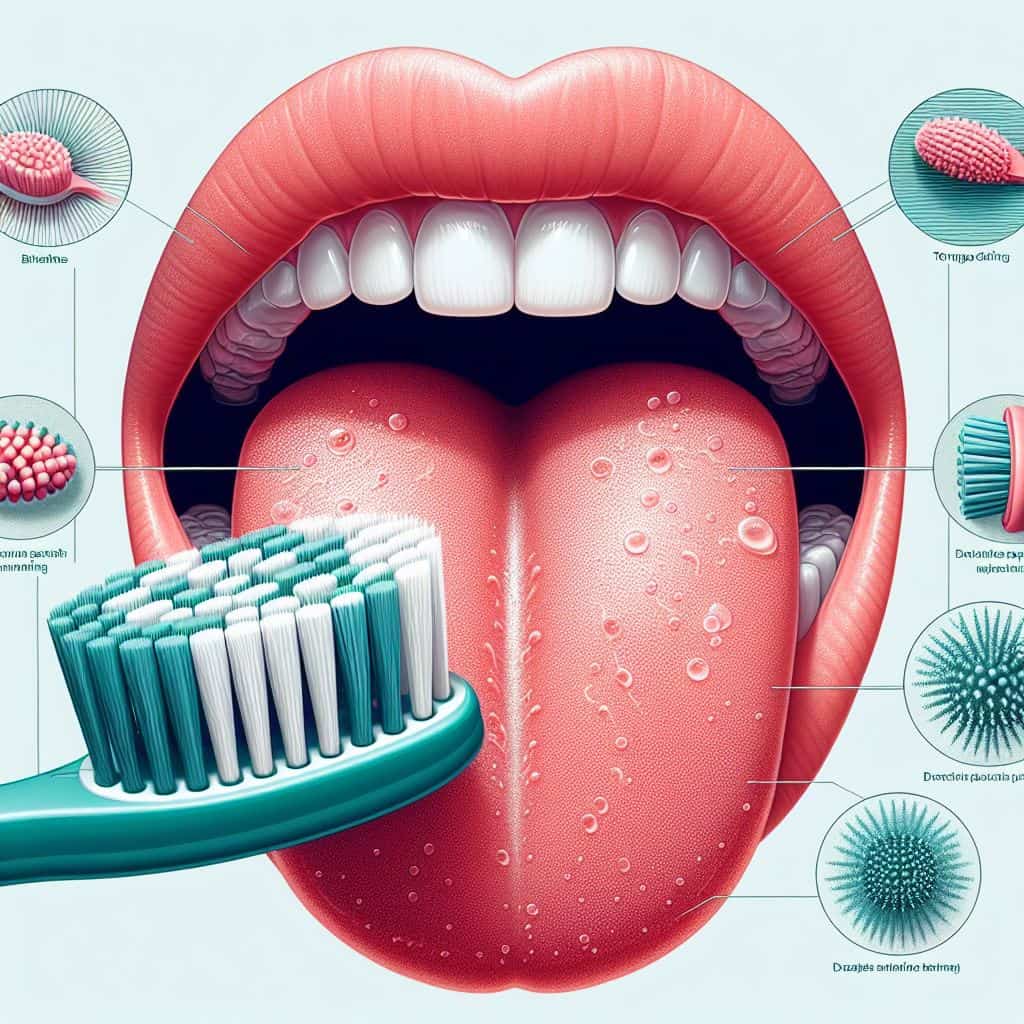Cleaning your tongue is an important part of maintaining good oral hygiene. Not only does it help freshen your breath, but it also removes bacteria and food debris that can lead to dental issues. In this blog, we will discuss five proven methods for cleaning your tongue, backed by research, to help you keep your mouth healthy and fresh.

1. Tongue Scraper
Using a tongue scraper is one of the most effective ways to clean your tongue. A tongue scraper is a tool specifically designed to remove bacteria, food debris, and dead cells from the surface of your tongue.
Research published in the Journal of Clinical and Diagnostic Research has shown that using a tongue scraper can significantly reduce the levels of bacteria on the tongue, leading to fresher breath and improved oral hygiene.
2. Toothbrush
Another effective way to clean your tongue is by using your toothbrush. Gently brush your tongue in a back-to-front motion to remove bacteria and debris.
Research published in the International Journal of Dental Hygiene suggests that using a toothbrush to clean the tongue can reduce the levels of volatile sulfur compounds (VSCs) in the mouth, which are responsible for causing bad breath.
3. Mouthwash
Using a mouthwash that contains antibacterial ingredients can help kill bacteria on your tongue and freshen your breath. Look for mouthwashes that contain ingredients like chlorhexidine or cetylpyridinium chloride.
A study published in the Journal of the Indian Society of Periodontology found that using a mouthwash containing chlorhexidine significantly reduced the levels of bacteria on the tongue compared to using water.
4. Natural Remedies
Several natural remedies can help clean your tongue and freshen your breath. One popular method is to mix a teaspoon of baking soda with water to create a paste, then use it to brush your tongue.
Baking soda has antimicrobial properties that can help kill bacteria on the tongue. Another natural remedy is to use a mixture of lemon juice and honey, which has been found to reduce the levels of bacteria in the mouth.
5. Tongue Brushes
Tongue brushes are another tool that can be used to clean your tongue. These brushes have soft bristles that are designed to gently scrub the surface of your tongue and remove bacteria and debris.
Research published in the Journal of Clinical and Experimental Dentistry has shown that using a tongue brush can significantly reduce the levels of bacteria on the tongue, leading to improved oral hygiene.
Fun Hacks!
Aloe Vera Gel
Aloe vera gel has natural antibacterial properties and can be used to clean your tongue. Simply apply a small amount of aloe vera gel to your tongue and gently brush it with a toothbrush or tongue scraper. Rinse your mouth thoroughly with water afterward.
A study published in the Ethiopian Journal of Health Sciences found that aloe vera gel has antibacterial properties and can effectively inhibit the growth of bacteria such as Streptococcus mutans, which is known to contribute to oral health issues.
Oil Pulling
Oil pulling is an ancient Ayurvedic practice that involves swishing a tablespoon of oil (such as coconut oil or sesame oil) in your mouth for about 15-20 minutes, then spitting it out. This technique can help remove bacteria and debris from your tongue and improve overall oral health.
Research published in the Journal of Clinical and Diagnostic Research has shown that oil pulling can significantly reduce the levels of bacteria in the mouth, including those on the tongue, leading to improved oral hygiene.

Fruit Peels
Fruit peels, such as those from oranges or lemons, can be used to clean your tongue. Simply rub the inside of a fruit peel on your tongue for a few seconds, then rinse your mouth with water. The natural acids in the fruit peel can help remove bacteria and refresh your breath.
A study published in the International Journal of Current Microbiology and Applied Sciences found that citrus fruit peels have antimicrobial properties and can effectively inhibit the growth of bacteria in the mouth, making them a natural option for cleaning the tongue.
Herbal Mouthwash
Herbal mouthwashes, made from ingredients like sage, mint, and cloves, can be effective in cleaning your tongue and freshening your breath. These natural ingredients have antibacterial properties that can help kill bacteria on your tongue.
Research published in the Journal of Clinical and Experimental Dentistry has shown that herbal mouthwashes containing ingredients like sage and mint can be effective in reducing bacteria levels in the mouth, including on the tongue.
Tongue Massage
Massaging your tongue can help improve circulation and remove dead cells, bacteria, and debris. Use your clean fingers to gently massage your tongue in circular motions for a few minutes, then rinse your mouth with water.
This technique can help improve the overall health of your tongue and mouth. A study published in the Journal of the Indian Society of Periodontology found that tongue-cleaning techniques, including massage, can significantly reduce the levels of bacteria on the tongue, leading to improved oral hygiene.
Summing Up!
Cleaning your tongue is an essential part of maintaining good oral hygiene. Incorporating these unique and fun hacks into your oral care routine can help you keep your tongue clean, freshen your breath, and improve your overall oral health.
Whether you prefer traditional methods like tongue scraping or are interested in trying natural remedies and techniques, there are plenty of options to choose from. Experiment with different methods to find what works best for you, and remember to be gentle yet thorough to avoid any irritation.
By making tongue cleaning a regular part of your oral care routine, you can enjoy a healthier mouth and a fresher smile.
FAQs
How often should I clean my tongue?
Cleaning your tongue should be done as part of your daily oral hygiene routine. It is recommended to clean your tongue once a day, preferably in the morning before brushing your teeth.
Can I use my toothbrush to clean my tongue?
Yes, you can use your toothbrush to clean your tongue. Gently brush your tongue in a back-to-front motion to remove bacteria and debris. However, using a tongue scraper or cleaner may be more effective.
Is it normal for my tongue to have a white coating?
A thin white coating on the tongue is normal and is usually caused by debris, bacteria, and dead cells. However, if the coating is thick or accompanied by other symptoms, it may indicate an underlying issue and should be evaluated by a dentist or healthcare professional.
Can cleaning my tongue help with bad breath?
Yes, cleaning your tongue can help reduce bad breath by removing bacteria and debris that can contribute to odor. It is an important part of maintaining fresh breath.
Are there any risks associated with cleaning my tongue?
Cleaning your tongue is generally safe, but it is important to be gentle to avoid irritation or injury. If you experience any discomfort or persistent issues, consult with a dentist or healthcare professional.
Can I use mouthwash to clean my tongue?
Mouthwash can be used as part of your tongue-cleaning routine to help kill bacteria and freshen your breath. Look for mouthwashes that specifically target bacteria on the tongue.
How long should I brush or scrape my tongue?
It is recommended to brush or scrape your tongue for about 10 to 15 seconds to effectively remove bacteria and debris. Be sure to cover the entire surface of your tongue.
Are there any natural remedies for cleaning my tongue?
Yes, several natural remedies can help clean your tongue, such as aloe vera gel, fruit peels, and herbal mouthwashes. These remedies can be effective in reducing bacteria and freshening your breath.
Can I clean my tongue if I have a tongue piercing?
Yes, you can clean your tongue if you have a tongue piercing. However, you should be careful around the piercing to avoid causing irritation or injury. It may be helpful to use a soft-bristled toothbrush or tongue cleaner.
Should children clean their tongues?
Yes, children can clean their tongues as part of their oral hygiene routine. However, parents should supervise and assist younger children to ensure they are cleaning their tongues properly and safely.
You may also be interested to read about our following popular posts on oral health:
1. Dental Floss vs. Water Floss: Choosing Your Dental Companion
2. Deep Teeth Cleaning: Pros and Cons Revealed
3. What are the Different Types of Dental Care Services?

